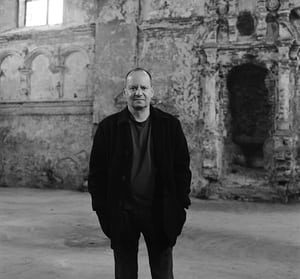In the Shadow of the Reich
On screen behind the stage at the Big Tent venue is a picture of Adolf Hitler, smiling and holding a hat. The lights go down and a silence descends. It is a strange way to begin a Sunday morning.
But even at 66 years remove from his father’s hanging at Nuremberg, it must be even stranger for Niklas Frank. Phillippe Sands begins the session with an explanation that the man on the right of the photograph is Hitler’s lawyer, Hans Frank, later to become Governor General of Occupied Poland, with all that that implies. The man on the right of the stage is his son, born in 1939. Sands also explains that the two men had debated whether to show the audience a second picture of Hans Frank, lying dead after the Nuremberg trials.
That Niklas Frank insisted that it be shown is not even to hint at the remarkable nature of this man who has spent a lifetime being ‘a puppet on his string’. In his book, called in its German version simply The Father, Frank explains – in powerful second person address – that ‘I made your death a part of me’, telling his father: ‘I am older now than you were ever able to be; that was what I aimed for.’
This promise to himself was made in the most extraordinary circumstances imaginable. As an already emotionally detached seven-year-old, Frank made a last visit to his father on 26 September 1946. From behind a pane of glass, despite that his small son knew his father’s sentence, Hans Frank continued to lie. ‘You just had to remain a bastard to the very end,’ says his Niklas in the book.
Promising not to let his life be ruined by his parents – a fate that met some of his siblings – Frank forged a distinguished career as a journalist before causing a scandal in Germany with the publication of his memoir in 1987. Breaking the taboo of ‘never speaking against your parents’, at the time Frank says he was ‘fed up with the silence all around me’.
Niklas Frank’s unpalatable approach to the heinous crimes of his father is borne out of the inconceivably horrific memory of his first intimations of what Hans Frank did. The son recalls seeing in the newspapers the dead bodies of children his own age, and an incident where a four-year-old was picked up by the legs and smashed against a wall. Knowing these things happened under his father’s orders while he sat playing in a house lined with stolen Rembrandts would be too much for most to bear.
What perhaps saved Niklas Frank from the ‘poison’ with which his father would have filled his brain was a single incident that came to him, amazingly, as a flashback when visiting Poland as a journalist to interview Lech Walesa. Frank now describes it as ‘the first cut in our relationship’. Under the mistaken impression that Niklas may have been fathered by his best friend during an affair with his wife, Hans Frank screamed at his son: ‘You are a stranger, not part of our family; what are you doing here?’
It would be very tempting, given the circumstances, for Frank Jr to go along with this questioning of his parenthood, but he insists that the Nazi war criminal is indeed his father. And he paints a portrait of his father that is verging on the stereotype of such a man. Hans Frank played piano, loved Shakespeare and Goethe and made regular trips to Salzburg and Vienna for opera. But for this man of culture, ‘the moral was gone very early’.
Sands asks the question on all our behalf, the question Frank has been asking his whole life: how could he? The writer posits several theories – he made Hitler into a Christ-figure after he ‘saved’ Germany from the ravages of Weimar era; he had a homosexual predilection for the Fuhrer – but nothing explains it. Nothing could.
And Frank, perhaps understandably given his background, is not optimistic for the future. ‘I don’t trust my people,’ he says more than once, quite willing to reiterate the theory that a strong Germany is a dangerous Germany. Asked by an audience member, ‘Is [today’s] Germany a Germany to be frightened of?’ he answers simply and chillingly: ‘Yes, for sure.’
Banner illustration by Dean Lewis











